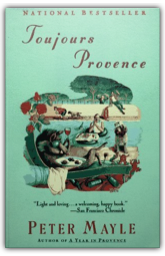
Peter Mayle offers us another funny and beautiful book about life in Provence. Here is a heart-warming portrait of a place where, if you can't quite "get away from it all," you can surely have the best of times trying. 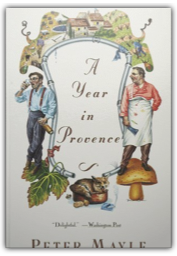
Who hasn't dreamed, on a mundane Monday or frowzy Friday, of chucking it all in and packing off to the south of France? Provençal cookbooks and guidebooks entice with provocatively fresh salads and azure skies, but is it really all Côtes-du-Rhône and fleur-de-lis? Author Peter Mayle answers that question with wit, warmth, and wicked candor in A Year in Provence, the chronicle of his own foray into Provençal domesticity. 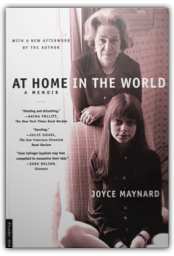
Joyce Maynard's memoir At Home in the World is an attempt to make peace with herself. At times, however, it's hard not to see it as an act of war—on her parents and, most notably, on J.D. Salinger. Maynard's account of her year-long relationship with the reclusive writer is the centerpiece of the book and the publicity pivot on which it turns. And how not? She first encountered Salinger when he wrote her a fan letter following her world-weary but not necessarily wordly wise New York Times Magazine cover piece, "An Eighteen Year Old Looks Back on Life." He was then 53 and, as Maynard paraphrases, wanted her "to know that I could be a real writer, if I would just look out for myself, as no other person is likely to." By the time she was 19, she was living with the increasingly controlling Salinger and doing her best to adhere to his regimens, from homeopathy at any price to a mostly macrobiotic diet heavy on frozen peas. (Lamb burgers, formed into patties and then frozen—before being cooked at a dysentery-friendly 150 degrees—also figure heavily.) 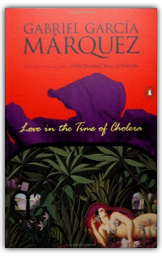
Published to worldwide critical acclaim, with more than one million copies already in print, this is the lush, wondrous story of an unrequited love that survives half a century and more than 600 distractions. 
The first edition of Vegan Lunch Box is sold out! A big thank you to all the fans of Vegan Lunch Box. Watch for a new edition from Marlowe & Company coming Spring 2008. 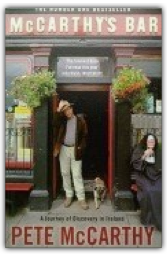
Although Pete McCarthy was raised in England, his mother hails from West Cork, and, despite never having lived there, he can't shake the strange feeling that Ireland is more home than home. A return pilgrimage reveals immediately why he (or anyone, for that matter) feels "involved and engaged" in Ireland. On arriving at the airport in Cork he's greeted by a guy in a giant rubber Celtic cross getup who's telling jokes with a latter-day St. Patrick (the guy who cast all snakes and pagans out of Ireland). Later, when McCarthy happens to mention that his surname matches that of the pub he's in (ever faithful to his Eighth Rule of Travel: "Never Pass a Bar That Has Your Name on It"), the owner buys him a Guinness, invites him to her raucous all-night birthday party, then insists he move to Ireland because, well, obviously he belongs. McCarthy's Second Rule of Travel states: "The More Bright Primary Colours and Ancient Celtic Symbols Outside the Pub, the More Phoney the Interior." While the island is turning into a haven for upmarket tourists—and McCarthy offers outstanding examples of bumbleheaded tourists in action—he still finds plenty of pubs where you can buy a bicycle and which still exist primarily as venues for conversation and Irish music sessions. 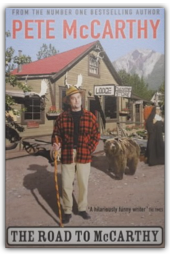
The amazing success of McCarthy's Bar put Pete McCarthy securely into the upper echelons of modern travel writers. His skills were many: an uncanny knack for evoking the ambience of the often bizarre and unlikely places he visited; insights into human behaviour that range from the sardonic to the insightful, and (best of all) a fractured sense of humour that made reading the book in public dangerous if you didn't want to embarrass yourself by spontaneously laughing out loud. There were those who feared that his new book The Road to McCarthy would not match its predecessor for quirky and idiosyncratic charm, but a few pages of the first chapter quickly puts paid to the nay-sayers. |
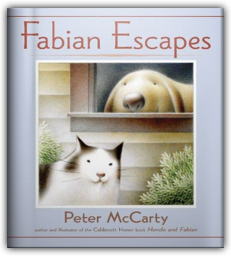
Caldecott Honor–winning Hondo and Fabian are back! 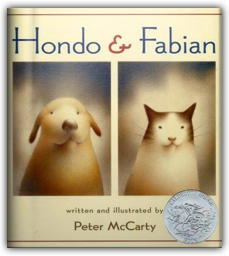
Hondo the dog has a fun day at the beach while Fabian the cat stays home. 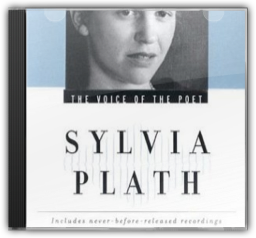
Before committing suicide in 1963 at the age of 31, Sylvia Plath wrote a bounty of work, including the final eight poems included in this self-read collection—described by Robert Lowell as her "appalling and triumphant fulfillment." This later work, as well as 13 additional recordings gathered here from Plath's short but significant career, are certainly triumphant: her prose is precise, scathing, utterly original, and mature beyond her years. Fortunately for listeners, Plath's voice mirrors her writing. She delivers "Lady Lazarus"—a piece about suicide, self-loathing, and her hatred for men—with a dagger-like cadence and clear, confident pitch. She describes a suicide attempt:It's easy enough to do it in a cell. 
Several years ago, while dutifully helping clean out her parents' basement, Wendy McClure struck comic gold when she discovered an intact and well-preserved collection of Weight Watchers Recipe Cards from 1974:They were neatly arranged in their own plastic file box. Plenty of the dishes seemed normal enough, but as I flipped through them, some of the recipes began to alarm me. And then I found the card for the Rosy Perfection Salad. I fell over. I laughed so hard I started coughing, and I fell back on the floor and I waved the card at my mom, who just rolled her eyes. 'Can I please have these? Please?' I begged. 'What do you want them for?' she asked. 'To cook?' 'No,' I said. She let me have them. I think they might have been my grandma's, but she never copped to actually buying them. Nobody else did, either. What McClure unearthed were astonishingly grim, unintentionally hilarious recipe cards (sample dishes: Aspic-Glazed Lamb Loaf and Snappy Mackerel Casserole) containing no nutritional information but illustrated with eerie photos clearly staged by a props department not averse to self-medicating. Compelled to share her discovery with the world, McClure posted the cards on a website, framing each with her own side-splitting and appropriately warped comments. The Amazing Mackerel Pudding Plan—a titled borrowed from one of the myriad improbably named recipes contained within—unleashes the entire god-awful collection. No review can quite capture the horrors of the recipe cards or the genius of McClure's riotous quips. Suffice to say these are milk-through-the-nose, tears-down-the-cheeks funny and a striking reminder of just how bent the 1970s were. Worth the price for the Molded Asparagus Salad and the Stuffed Apples Ganges cards alone. —Kim Hughes 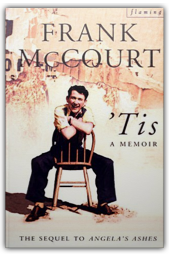
From the author of the million-selling Angela's Ashes — the most keenly anticipated sequel of the decade. Angela's Ashes was a publishing phenomenon. Frank McCourt's critically acclaimed, lyrical memoir of his Limerick childhood won the Pulitzer Prize, the National Book Critics' Circle Award, the Royal Society of Literature Award and the Los Angeles Times Award amongst others, and rapidly became a word-of-mouth bestseller topping all charts worldwide for over two years. It left readers and critics alike eager to hear more about Frank McCourt's incredible, poignant life. 'Tis is the story of Frank's American journey from impoverished immigrant with rotten teeth, infected eyes and no formal education to brilliant raconteur and schoolteacher. Saved first by a straying priest, then by the Democratic party, then by the United States Army, then by New York University — which admitted him on a trial basis though he had no high school diploma — Frank had the same vulnerable but invincible spirit at nineteen that he had at eight and still has today. And 'Tis is a tale of survival as vivid, harrowing, and often hilarious as Angela's Ashes. Yet again, it is through the power of storytelling that Frank finds a life for himself. 'It is only the best storyteller who can so beguile his readers that he leaves them wanting more when he's done...McCourt proves himself one of the very best' (Newsweek). 'Tis blesses readers with another chapter of McCourt's story, but as it closes, they will want still more. 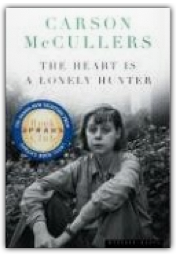
With the publication of her first novel, THE HEART IS A LONELY HUNTER, Carson McCullers, all of twenty-three, became a literary sensation. With its profound sense of moral isolation and its compassionate glimpses into its characters' inner lives, the novel is considered McCullers' finest work, an enduring masterpiece first published by Houghton Mifflin in 1940. At its center is the deaf-mute John Singer, who becomes the confidant for all various types of misfits in a Georgia mill town during the 1930s. Each one yearns for escape from small town life. When Singer's mute companion goes insane, Singer moves into the Kelly house, where Mick Kelly, the book's heroine (and loosely based on McCullers), finds solace in her music. Wonderfully attune to the spiritual isolation that underlies the human condition, and with a deft sense for racial tensions in the South, McCullers spins a haunting, unforgettable story that gives voice to the rejected, the forgotten, and the mistreated — and, through Mick Kelly, gives voice to the quiet, intensely personal search for beauty. 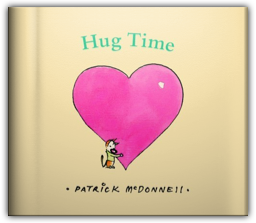
There was once a kitten so filled with love he wanted to give the whole world a hug! |

My Library
Collection Total:
1390 Items
1390 Items
Last Updated:
Mar 22, 2009
Mar 22, 2009

 Made with Delicious Library
Made with Delicious Library